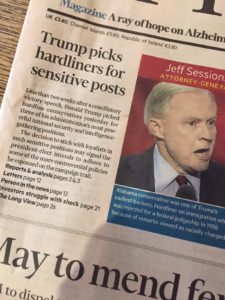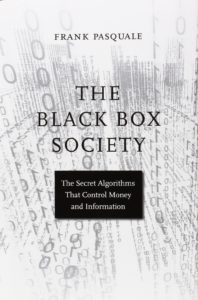
Already, as the shock subsides, people are reaching desperately for an illusion of normality. And we can see two things happening.
The first comprises efforts to persuade people that Trump can’t be as dangerous as he seemed during the campaign, that he’s a typical salesman — willing to say anything to close the deal. And that the American constitutional system was so constructed to prevent any tyrant being an efficient wielder of power.
The second is that we see the aphrodisiac effect of power in action. It’s like great wealth — power creates a force-field around individuals that leads apparently sane and decent people to lose their judgement, and sometimes their principles. And of course it’s a giant attractor for unscrupulous and ambitious people. We could see this happening on CNN on the night of the election: the panellist who was supposed to represent the Trump point of view was treated like a pariah at the beginning of the night; but by the end he had attained the status of the Oracle of Delphi. We will see a lot more of this kind of servile cringe in the months ahead.
Meanwhile in the New York Review of Books Masha Gessen, a Russian and American journalist, author, and activist noted for her opposition to Vladimir Putin, has written a powerful antidote to this kind of human frailty. Her piece is worth reading in full, but here’s an excerpt from her ‘Rules for Surviving’ autocracy.
Rule #1: Believe the autocrat. He means what he says. [See the photograph above.] Whenever you find yourself thinking, or hear others claiming, that he is exaggerating, that is our innate tendency to reach for a rationalization. This will happen often: humans seem to have evolved to practice denial when confronted publicly with the unacceptable…
Rule #2: Do not be taken in by small signs of normality. Consider the financial markets this week, which, having tanked overnight, rebounded following the Clinton and Obama speeches. Confronted with political volatility, the markets become suckers for calming rhetoric from authority figures. So do people. Panic can be neutralized by falsely reassuring words about how the world as we know it has not ended…
Rule #3: Institutions will not save you. It took Putin a year to take over the Russian media and four years to dismantle its electoral system; the judiciary collapsed unnoticed…
Rule #4: Be outraged. If you follow Rule #1 and believe what the autocrat-elect is saying, you will not be surprised. But in the face of the impulse to normalize, it is essential to maintain one’s capacity for shock. This will lead people to call you unreasonable and hysterical, and to accuse you of overreacting. It is no fun to be the only hysterical person in the room. Prepare yourself.
Rule #5: Don’t make compromises. Like Ted Cruz, who made the journey from calling Trump “utterly amoral” and a “pathological liar” to endorsing him in late September to praising his win as an “amazing victory for the American worker,” Republican politicians have fallen into line. Conservative pundits who broke ranks during the campaign will return to the fold. Democrats in Congress will begin to make the case for cooperation, for the sake of getting anything done—or at least, they will say, minimizing the damage…
Rule #6: Remember the future. Nothing lasts forever. Donald Trump certainly will not, and Trumpism, to the extent that it is centered on Trump’s persona, will not either. Failure to imagine the future may have lost the Democrats this election. They offered no vision of the future to counterbalance Trump’s all-too-familiar white-populist vision of an imaginary past.



